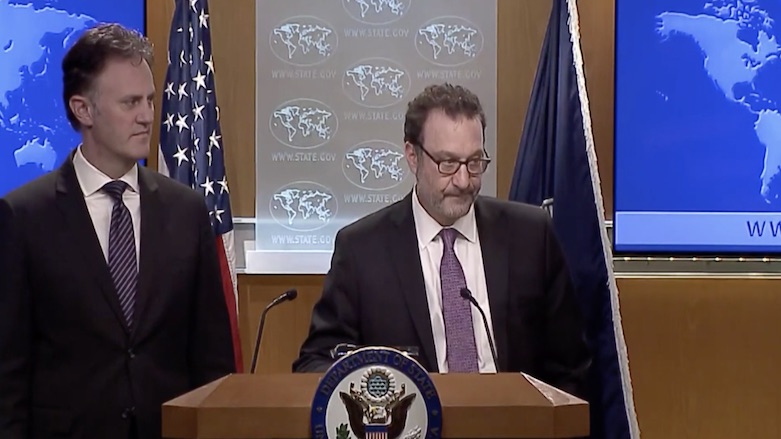US sanctions Kata’ib Hizbollah leader, amid broader concerns about poor governance in Baghdad

WASHINGTON DC (Kurdistan 24) – The US announced on Wednesday that it was imposing sanctions on the Secretary General of Kata’ib Hizbollah, Ahmad al-Hamidawi.
Kata’ib Hizbollah is an Iranian-backed Iraqi militia, which is also active in Syria, where it has fought in support of the regime of Bashar al-Assad. Washington already designated Kata’ib Hizbollah as a terrorist organization in 2009 for attacking US and allied forces during Operation Iraqi Freedom (OIF), which was then still ongoing.
Speaking of the situation a decade later, the State Department’s Counterterrorism Coordinator, Amb. Nathan Sales, explained to journalists that Kata’ib Hizbollah has been “responsible for numerous terrorist attacks against US and coalition forces,” including a rocket attack last December on an airbase near Kirkuk that killed an American contractor.
That attack precipitated a US retaliatory strike against Kata’ib Hizbollah, which then joined with other “Iran-backed terrorists,” as Sales characterized them, to assault the US embassy in Baghdad. That, in turn, led to the US strike that killed Qasim Soleimani, head of the Quds Force of Iran’s Islamic Revolutionary Guard Corps (IRGC).
Sales noted that Kata’ib Hizbollah had also attacked Bahrain’s embassy in Iraq last June, while in October, it “was involved in sniper attacks against peaceful protestors in Baghdad,” killing over 100 people.
“And when Iraqi President Barham Salih met with President [Donald] Trump in Davos last month,” Sales continued, the group demanded “Salih’s resignation with a veiled threat against his life.”
New US Policy of Sanctioning Iraqi Political Figures
David Schenker, Assistant Secretary of State for Near Eastern Affairs, explained that Wednesday’s step against Hamidawi was the most recent US measure in an ongoing policy “to hold accountable those who present a clear and present danger to both our people and the Iraqi people.”
Schenker noted that another Iraqi group, Asa’ib Ahl al-Haq, had been designated a terrorist organization last month, along with its leader, Qais al-Khazali, and his brother Laith, a senior member of the organization.
Husayn Falih al-Lami, who heads the Central Security Directorate of Iraq’s Popular Mobilization Forces (PMF), was sanctioned for “serious human rights abuses,” while Khamis al-Khanjar was designated “for bribing government officials and engaging in widespread corruption at the expense of the Iraqi people.”
“The US stands with the Iraqis who are fed up with economic stagnation, endemic corruption, and mismanagement,” he affirmed.
Responding to a question from Kurdistan 24, Schenker noted that Kata’ib Hizbollah was a “constituent group” within the PMF. “It’s funded by the Government of Iraq,” he said, characterizing that as “deeply problematic.”
Additionally, the US is “certainly concerned” about Baghdad’s “failure to protect the US diplomatic facility and other facilities throughout the country,” Schenker stated, “historically,” on Dec. 31 and Jan 1, “when the government did not fulfill its obligations, its international obligations, to protect the embassy.”
Editing by Karzan Sulaivany
